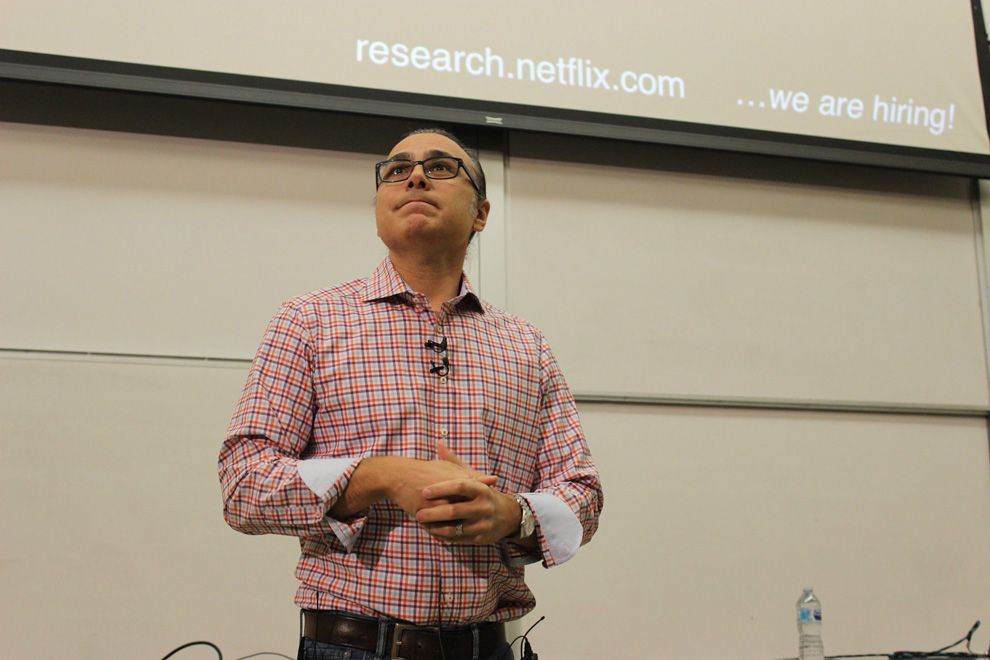Netflix Machine Learning Director Tony Jebara discussed the role of machine learning in personalized streaming services during a presentation to a packed audience at the Hewlett Teaching Center on Monday. Jebara’s talk was the second in this quarter’s Artificial Intelligence (AI) in Real Life Seminar Series, offered to students as the one-unit course CME 500.
Although his discussion centered on machine learning applications in Netflix, Jebara began by showing a picture of cave drawings. He stressed the importance of storytelling, saying it is “fundamentally what distinguishes humans from animals.”
Jebara continued the history lesson, as he discussed the creation of the printing press in 1440 and of film in 1927. He noted that, with written word and film, “the person communicating [a] story doesn’t know what’s resonating, what’s not and how to improve storytelling” in most cases because they lack the direct feedback an audience could provide during in-person storytelling.
However, Jebara said that applying machine learning to data solicited from users allows Netflix to proactively reach their audiences.
“Now we can start seeing what each account is interested in, what shows are they watching, what are they fast forwarding, what are they hovering over, what are they giving thumbs up to and thumbs down to,” Jebara said. “That kind of closes the feedback loop that we lost as we went to millions and billions as we scaled up.”
Jebara highlighted some concerns with machine learning, such as the fact that computers analyze correlations rather than causal relationships. He showed a graph of positively correlated airline prices and number of flights taken, explaining that a machine learning model may suggest increasing the price of plane tickets further to increase profit, whereas there are actually confounding factors involved and raising prices would discourage flights.
“There are causal relationships that matter, and it isn’t just about finding these correlations,” Jebara said. “It’s not just about getting X to predict Y as accurately as possible.”
Later in the talk, Jebara highlighted how machine learning can affect the images Netflix users see for different films and series. For instance, he showed how the image users see for the movie “Good Will Hunting” changes based on the users’ viewing histories. People who watch relatively many comedies may see a picture featuring a comedian from the film, whereas people who watch relatively many romance films may instead see an image from a kissing scene in the film.
Still, Jebara said the goal of machine learning is not to dictate users’ experiences but rather to “minimize friction, minimize amount of delay and extra steps.”
Jebara concluded his presentation with a call for students to consider working for Netflix. In a post-presentation interview with The Daily, he said he decided to speak at Stanford in particular because of its reputation and proximity to the Netflix headquarters in Los Gatos, California.
“We have a 20-minute drive between Los Gatos and Stanford, and there are great people here working on problems that we’re excited by when we read the papers at work,” Jebara said. “Getting that communication channeled — because it can lead to real collaborations and real internships — is hopefully the outcome.”
Also in the interview, Jebara reiterated the importance of artists in developing the videos his team markets on Netflix. He noted that machine learning tools are assistive tools meant to enhance the work of content creators.
“[Programmers] have to work with all sorts of teams,” Jebara said. “The concept of AI taking over is really kind of nonsensical because — if someone is making a movie — maybe they want to use your tool … but in the end, human beings are the best story creators, and people are experts at this.”
Contact Holden Foreman at hs4man21 ‘at’ stanford.edu.
